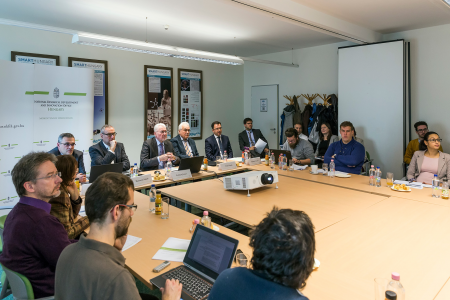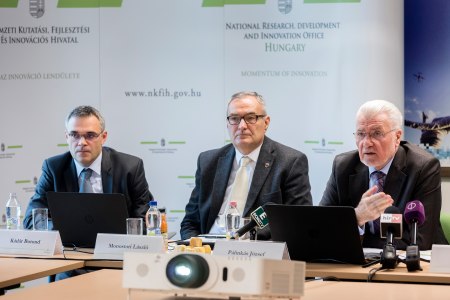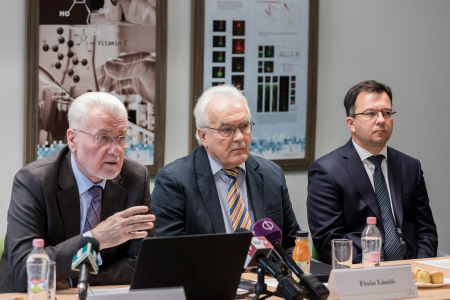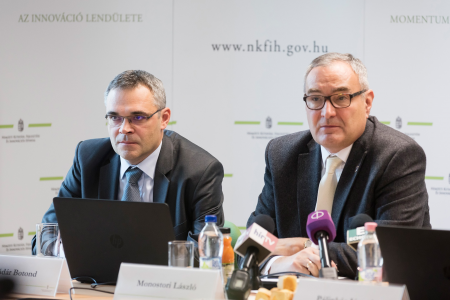Hungary was the most successful country in the ”Teaming” research excellence programme, the most prestigious call of Horizon 2020 Widening programme. The two successful projects coordinated by the National Research, Development and Innovation Office consisting of excellent Hungarian and international partners have been awarded EUR 26 million (around HUF 8 billion).
With additional domestic funding and contribution of participating institutions HUF 22 billion is available for the implementation of the two programmes in the field of life sciences and production informatics and control.
Development activities in the field of Cyber-Physical Production Systems can start in the Institute for Computer Science and Control of the Hungarian Academy of Sciences and the Budapest University of Technology and Economics. The other successful initiative establishes a Centre of Excellence for Molecular Medicine to support the most up-to-date research in the field of medicine and to encourage clinical application of the results of basic research in the University of Debrecen, University of Szeged, the Biological Research Centre of the Hungarian Academy of Sciences, and Semmelweis University. These programmes will provide outstanding opportunities for Hungarian and foreign young researchers and will contribute to breakthroughs in molecular diagnostics in the field of metabolism, cardiovascular, cancerous and inflammatory diseaseses that are affecting the ageing population.
The two projects have been awarded EUR 26 million (HUF 8 billion) within the framework of the Teaming programme of Horizon 2020.
The two Hungarian consortia are collaborating with internationally renowned research centres. In the production informatics and control programme the German Fraunhofer Institute, while in the medicine project the German European Molecular Biology Laboratory (EMBL), the leading institute in integrating life science research are cooperating with the Hungarian partners and sharing international best practices with them.
Only ten projects have been selected for funding out of 169 proposals submitted from 27 countries during the two-stage selection process, therefore the fact that two of these projects are led by Hungarian coordinators is a unique success. These grants constitute 20% of the funding received by Hungarian institutions to date from the H2020 research and innovation programme, a direct EU programme.
Not only scientific excellence but also the credible sustainability plan and major government commitment to provide funding played a key role in the success of the proposals. Beside the direct EU funding grant, the Hungarian-led consortia selected for funding in the Teaming programme will receive financial support from the national budget source, the National Research, Development and Innovation Fund, pursuant to the government decision of July 2016. The budget including the EU grant, the national financial support and the contributions of consortium partners is approximately EUR 21.7 million, i.e. HUF 6.5 billion in the production informatics and control programme and EUR 52 million, i.e. HUF 15.6 billion in the life sciences programme.
The aim of the first phase of the recently closed international call was to develop a sustainability plan for future Centres of Excellence, namely to present the procedures and timeline of setting up their structures, their operational framework, their science and innovation strategy and the long-term and sustainable funding model. Following the first phase selection only 31 out of the 169 projects, including three Hungarian-led consortia (EPIC on production informatics and control, HCEMM-MOLMEDEX on life sciences and SMARTPOLIS on information technology; although the latter had not been selected for funding) could be supported by a preparatory funding for a one-year-period lasting until May 2016. Only the best 10 projects out of the 31 proposals elaborated for phase two were selected by the evaluators. Hungary is the only participating country with two winning proposals – both successful proposals had been coordinated by the National Research, Development and Innovation Office.
The primary role of the NRDI Office was – in line with the Teaming call under the Horizon 2020 programme - to ensure government commitment towards the proposals submitted, in both professional and financial terms, as well as consistency between the proposals and the national research and innovation strategies, and in addition to encourage partnership among the Hungarian participating institutions, within the spirit of the .
The two Hungarian projects:
EPIC – Centre of Excellence in Production Informatics and Control
The main goal of the Centre of Excellence on Cyber-Physical Production Systems is to boost the innovation process, to create industry-relevant results, to train the next generation of highly skilled experts and to ensure the background for a sustainable and competitive production ecosystem for various industry sectors in Hungary and in Europe. Related to the EPIC projects topic organised and headed by MTA SZTAKI the National Industry 4.0 Technological Platform was established on May 2016 with the aim to adapt the „Industrie 4.0” initiative in Hungary.
The EU contribution from the Horizon 2020 framework programme is EUR 10 876 825 (HUF 3.26 billion), the financial support of the National Research, Development and Innovation Office is EUR 3.6 million (HUF 1.08 billion) which is backed with a significant amount of grants from the Economic Development and Innovation Operational Programme and own contribution of the participating organizations which amount to EUR 7.3 million (HUF 2.2 billion). The full budget of the project is EUR 21.7 million (HUF 6.5 billion).
The applied research / innovation objective of the proposal is to strengthen the ability of SZTAKI and the two faculties of BME to transfer the research results to the industry with the support of the participating FhG institutions.
Members of the EPIC consortium:
- Institute for Computer Science and Control, Hungarian Academy of Sciences (MTA SZTAKI)
- Faculty of Mechanical Engineering and the Faculty of Transportation Engineering and Vehicle Engineering of the Budapest University of Technology and Economics (BME)
- Fraunhofer institutions from Germany (IPA-Stuttgart, IPK-Berlin, IPT-Aachen) and from Austria (Fraunhofer Austria).
HCEMM-MOLMEDEX – Creating the Hungarian Centre of Excellence for Molecular Medicine
The goal of the project is to set up the Hungarian Centre of Excellence for Molecular Medicine placing strong emphasis on translational medicine and promoting the clinical application of basic research results. The research teams participating in the project have already made significant progress, inter alia, in understanding the molecular disorder causing morbid obesity, diabetes, heart failure, genomic instability and carcinogenesis, coeliac disease and macula degeneration, in identifying therapeutic targets and in creating successful cooperation with the health industry.
The research programmes of the new centre of excellence are planned to be implemented in Szeged, Budapest and Debrecen, its headquarters will be hosted in the new innovation park in Szeged, in ELIPOLIS. During the first project phase the institutions participating in the initiative have mapped the molecular medicine landscape in Hungary, identified the Hungarian research teams of international standing and harmonized their research schemes. They have jointly designed the long-term scientific, strategic and sustainability plan of the new centre of excellence taking the legal form of a non-profit, public benefit company.
The project will receive a contribution of nearly EUR 15 million (approximately HUF 4.5 billion) from the H2020 programme, the NRDI Office will ensure an additional amount of EUR 5 million from the NRDI Fund for the 7-year-period which is backed with EUR 32 million (HUF 9.6 billion) from project funds under the Economic Development and Innovation Operational Programme (GINOP) and from major own sources of the participating organizations. Consequently, the full project budget is approximately EUR 52 million, i.e. HUF 15.6 billion.
Members of the HCEMM-MOLMEDEX consortium:
- University of Szeged (SZTE)
- Biological Research Centre of the Hungarian Academy of Sciences (MTA SZBK)
- University of Debrecen (DE)
- Semmelweis University (SE)
- European Molecular Biology Laboratory (EMBL)
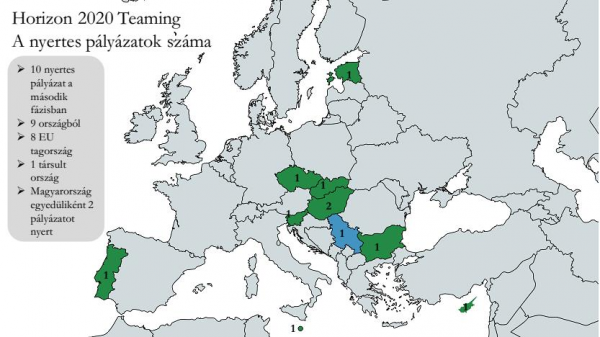 |
|
Number of awarded Teaming applications split by countres
|
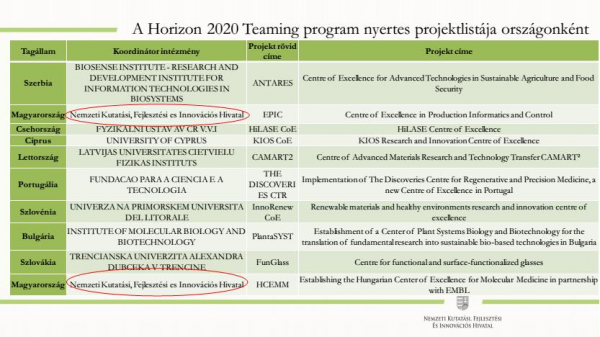 |
|
List of awarded Teaming projects |
About the Teaming programme
The aim of the Teaming call of the Spreading Excellence and Widening Participation programme of the Horizon 2020 framework is to support the creation of Centres of Excellence in low R&I performing countries, building on partnerships between leading scientific institutions and partner institutions in low R&I performing countries. Countries eligible for participation: Bulgaria, Croatia, Cyprus, Czech Republic, Estonia, Hungary, Latvia, Lithuania, Luxembourg, Malta, Poland, Portugal, Romania, Slovakia, Slovenia. Associated countries can also submit proposals: Albania, Armenia, Bosnia and Herzegovina, Faroe Islands, former Yugoslav Republic of Macedonia, Georgia, Moldova, Montenegro, Serbia, Tunisia, Turkey, Ukraine.







